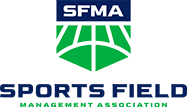1-3 pm EST
Let’s Clear Up the Confusion on Wetting Agents and Sports Turfgrass
Michael Fidanza, Ph.D. and Stan Kostka, Ph.D. – Penn State University
REGISTER HERE
Soil surfactants (also referred to as wetting agents) are staples of turfgrass maintenance programs to treat localized dry spots, mitigate soil water repellency, and to improve rootzone water delivery, water use efficiency, nutrient access, and enhance overall plant health. The goal of this seminar is to provide sports field managers with an introduction into the basic concepts of soil water, the development of water repellency in soils, and basic principles on soil surfactant mode of action and their impacts to enhance water management and improve turfgrass performance, and how to make sense of all the soil surfactant products in the marketplace.
Attendees will gain:
-An understanding into the concepts of soil water dynamics with the turfgrass rootzone.
-Further insight into how the soil surfactants in today’s marketplace are classified and categorized.
3:30-4:30 pm EST
Expert Expectation Management for Sports Field Experts
Ryan DeMay, CSFM- Field Source Consulting
REGISTER HERE
As Sports Field Managers we are always at the hub of the wheel that drives people, sports, and turfgrass. When all those things come together just right, it’s not luck. It takes fantastic people skills, consistent communication, and above all, managing expectations of all those around you. From basic cultural practices to annual maintenance programs to renovations and construction, managing expectations as the expert on staff is a skill that separates good from great.
In this seminar, we will take a deep dive into the most effective strategies and tactics for managing the expectations of our staff, administrators, front office staff, athletic directors, programmers, coaches, athletes, parents, contractors, vendors, and other stakeholders. Some of the strategies we will cover:
-Defining Success – With so many voices at the table, how do we clearly define and agree on what success looks like for fields and facilities? Hear all perspectives, identify common “wins”, and agree on achievable priorities, outcomes, and measurements for success.
-Cultural Practices and Capital Improvements – With success defined, how do we lay out the path to success for our fields to stakeholders? Frame the issues, present the benefits, sell the outcome.
-Delivering the Goods – Now with a solid plan is in place, how do we work through the challenges that come our way seemingly every day? Staying on track, over-communicating, and building trust.
-Reflecting and Forecasting – The season is over, the project is complete, but how do we know if we succeeded? Review our success measurements, get feedback from all stakeholders, prepare to do this ALL over again to make the fields and your staff even better!
By employing these strategies of properly managing expectations, Sports Field Managers can better position themselves as the trusted experts within our organizations who get the job done right, on time, and with integrity.
Regardless of the size of your organization, these strategies have been proven to reduce the anxiety and worry of the unknowns in our industry while increasing the trust and belief in our abilities as Sports Field Managers.
Attendees will:
-Understand the influence they have as Sports Field Managers to properly set and manage expectations within their organizations.
-Learn how to employ a “customer-first” attitude when managing expectations with staff, administrators, coaches, and other stakeholders.
-Leave feeling confident about their role as Sports Field Managers to guide their organization’s process for consistently producing safe, high-quality, playable sports fields.

